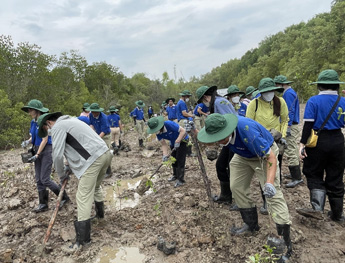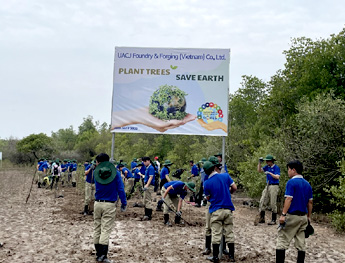Supporting Environmental Health and Nature (Nature Positive)
Basic Approach
UACJ has designated “supporting environmental health and nature” as a materiality issue in the environmental field, and aims to minimize the impact on nature throughout our supply chain and contribute to Nature Positive (where support for environmental regeneration, creation and conservation is appropriately balanced with the economy).
Specifically, we are actively reducing the environmental impact of our business activities through the active use of recycled materials, recycling of water, and proactive forest conservation activities, while also promoting the restoration and recovery of forests and water resources. With respect to water recycling in particular, we are working to reduce our environmental impact by positioning the reuse of water used in manufacturing as a routine, everyday task, and have set a target of reducing the amount of water withdrawal per unit of production by 25% from the fiscal 2020 level by fiscal 2030. We are also taking measures to minimize our impact on nature, such as reducing the use of new ingots by promoting aluminum recycling, reducing new mining of bauxite as a raw material, and avoiding deforestation and the endangerment of threatened species.
We are keenly aware that our business activities both benefit and impact the natural environment in various ways, and we will continue to work to reduce our environmental impact and contribute to supporting environmental health and nature in ways that only UACJ can.
Water withdrawal reduction rate over time
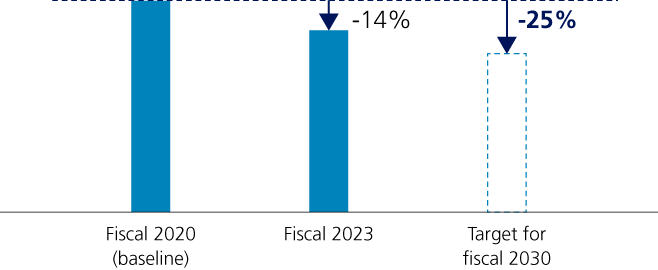
Road map for Supporting Environmental Health and Nature (Nature Positive)
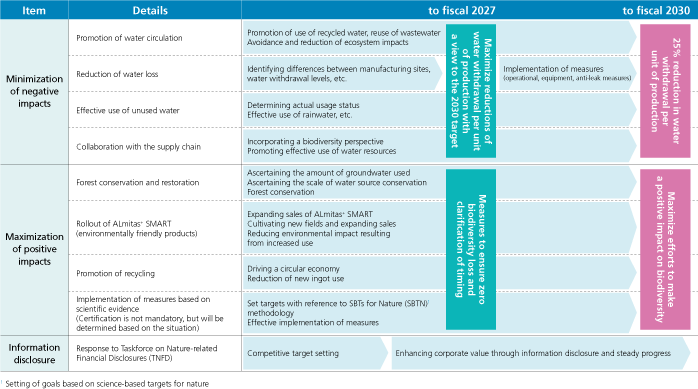
Toward disclosures based on TNFD recommendations
As part of its Nature Positive initiatives, UACJ is working to minimize its negative impacts, using reduction of water withdrawal per unit of production as a KPI, and to maximize its positive impacts through recycling. As we move forward with these efforts, we are preparing to disclose information in accordance with the TNFD*2 framework.
An action plan based on the business strategy will be developed in fiscal 2024 and implemented from fiscal 2025 onwards. Disclosures based on the TNFD will be included in the Integrated Report for the next fiscal year.
*2 Taskforce on Nature-related Financial Disclosures
Road map for TNFD response
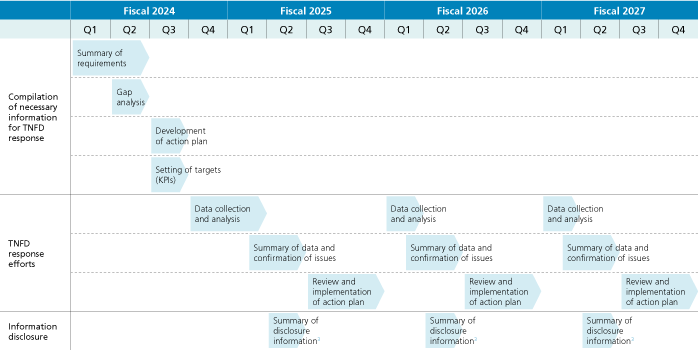
*3 Regularly disclose status of TNFD response in the Integrated Report and explain at sustainability briefings
Identifying Risks to Biodiversity
We recognize the possibility that our operations and products could have a significant impact on the natural environment and biodiversity from during the processes of mining the raw materials, manufacturing the products, during the use of the final products containing aluminum, and in the disposal stage. The UACJ Group strives to understand all of the risks to biodiversity associated with its business activities. We consider the biggest risk to be wastewater from one of our manufacturing plants impacting the habitat of aquatic organisms, and take extensive measures to minimize that potential, including 24-hour monitoring, by maintaining wastewater quality standards that are above and beyond legal requirements.
Making Packing Materials Recyclable
The UACJ Group pursues reuse, recycling, conversion to other materials, and other approaches for handling wood-based materials used in our products or as packing material. In the past, we used wood-based packing materials for some of the raw materials for our products. These wood-based materials, however, are not recyclable and must be disposed of as industrial waste. To improve upon this situation, we switched to cardboard packing materials, which are easily recyclable. By reducing our use of wood materials and producing less waste, the UACJ Group aims to help reduce the harvesting of trees, which provide habitats for various types of living organisms.
Helping to Eliminate Invasive Species
In an era of globalization, non-native species entering Japan as pets or as a result of the movement of goods and people are endangering native species by threatening their habitat and, through crossbreeding, their gene pools.
The UACJ Group cooperates with the invasive species extermination efforts of local governments and encourages employees to participate as volunteers.
Greening Activities
We are adding plant life to our business sites to create habitats for local flora and fauna.
Topics
Corporate afforestation agreement with Fukui Prefecture and Sakai City
-----Promoting regional environmental conservation through tree planting and forest management
The UACJ Fukui Forest
UACJ, Fukui Prefecture, and Sakai City hosted a tree planting and signing ceremony for their new corporate afforestation agreement on March 12, 2022.
Fukui Prefecture is promoting corporate forestation in which companies rent land from owners free of charge and take on the responsibility of maintaining the forest. Our agreement with the prefecture will enable us to strengthen our local environmental conservation activities, interact with local communities, and raise the environmental awareness of our employees. The agreement with Sakai City allows us to name the leased plots the UACJ Fukui Forest and to carry out forest management activities, such as planting trees and clearing underbrush with support from the city and prefecture.
A total of about 300 red pines and black pines have been planted under the agreement and activities continue, including underbrush clearing and tree planting. In June and July 2023, a total of 45 employees and their families helped to clear underbrush around the trees.
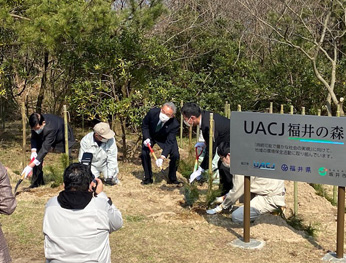
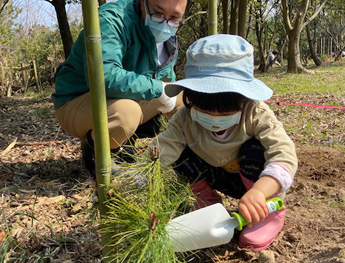
Mangrove Forest Restoration Activities in Vietnam
UACJ Foundry & Forging (Vietnam) Co., Ltd. participates in a mangrove forest restoration project. In May 2023, around 50 of its employees helped to plant approximately 500 mangrove trees in the mangrove forest at Can Gio.
